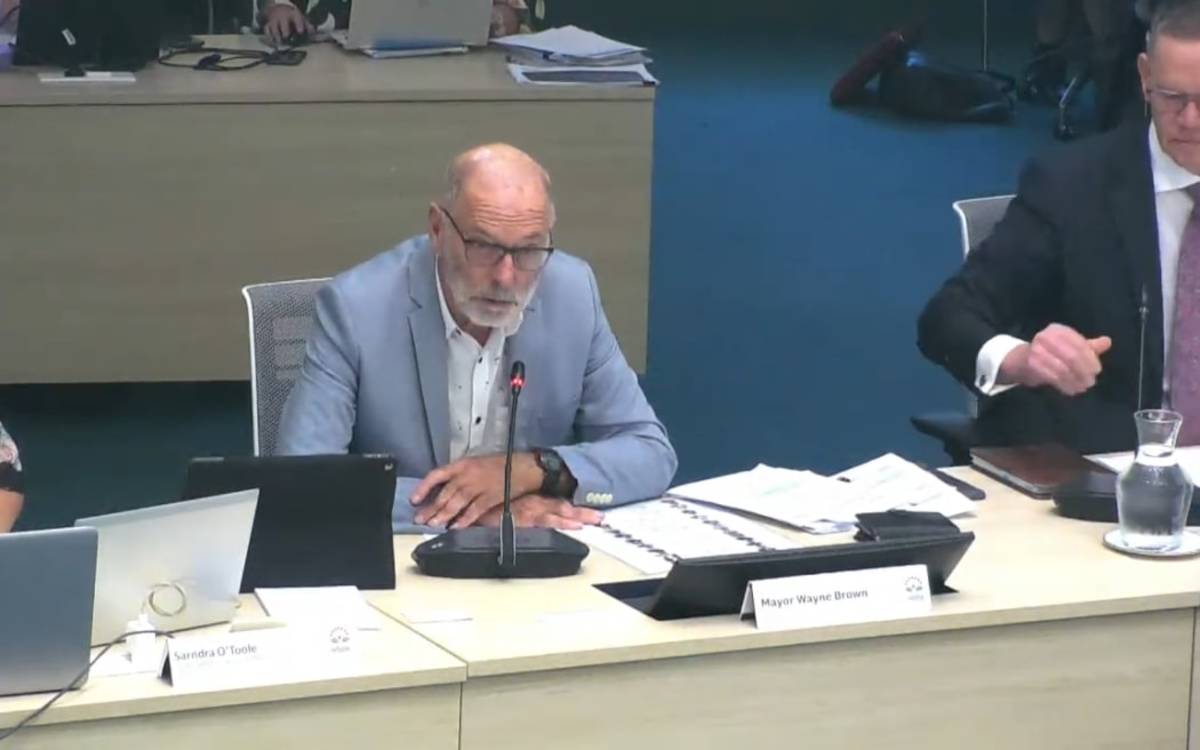
By Mary Afemata of Local Democracy Reporting
Meetings via zoom and flexible work arrangements have become office norms, but while some employees are being ordered back to their desks, Auckland Council is continuing to give its employees options to work smarter.
At last week’s government body meeting, Auckland Mayor Wayne Brown reminded the two online attendees of upcoming changes.
“This is the last council meeting that you can attend online, from now on, you gotta show up.”
He also reminded them of electronic attendance protocols.
“I’d ask you observe that you should be in a secure place during the meeting if you’re not present here and you should not be driving while connected to the meeting. Please be present and ensure your phone is turned off at the very least on silent.”
While attendance at council meetings will be mandatory, Auckland Council chief executive Phil Wilson announced staff could conduct other council business in a way that works for them.
“We do have flexible workspaces in office buildings around the region, and it does make a big difference to people, even if it’s one day a week, to have an opportunity to work in our Manukau office rather than commute in from Pukekohe or whatever other equivalent example you want to choose from around the region.
“It is valuable to people. It helps them manage family and other responsibilities and reduces commuting costs, so we’re in a good place here.
“We actually have higher occupancy of our key office buildings than we have done for several years and that is about the level prior to COVID.”

Te Wharau o Tāmaki Auckland House, the Council’s main office, has seen a significant increase in occupancy, reaching 86% across all its sites — higher than before the pandemic. Since 2018, the council has also downsized leases and sold buildings, reducing its corporate property footprint by 50%, saving ratepayers $35 million.
Councillor Lotu Fuli said the approach is a win-win for the Auckland Council area, which stretches from Rodney, to the Hibiscus Coast, to Pukekohe and out to Waiheke.
“We have many CBDs in our beautiful city, so our thousands of workers, they are able to work partially at home and still partially in the office.
“But when we say the office, we mean if you live close to the Manukau Civic building, you can go there for your meetings, if you live closer to the Pukekohe Local Board area or library, you can go there and use our council buildings there.”
Through its WorkSmart programme, the Council has adopted hot-desking and remote work options, which support a work-life balance, increase flexibility for staff, and reduce traffic congestion.
Auckland House occupancy peaked at 86%, Hawiti in Albany is 97% full, Te Ipu Kura a Maki in Henderson is at 73%, and Te Puutahitanga in Manukau recently hit 107%, driven by a team working outside typical 9am–5pm hours. And since April 2024, council-wide occupancy has consistently been at least 71% each month.
“For our staff, it’s very important that we maintain that balance, and actually we know that our productivity is up as a result,” Fuli says.

Face-to-face vs virtual (italics heading)
Last week, Public Service Minister Nicola Willis encouraged government departments to call their staff back to the office and enforce stricter rules around working from home.
“Working from home is not an entitlement and should be by agreement between the employee and the employer,” Willis said.
Currently, employees can request flexible working arrangements and employers must have a valid reason to decline the request.
Fuli said there are meetings where face-to-face are necessary, but welcomed the other options as a way to reduce time spent in the car, and the environmental impact.
“We have declared a climate emergency as a city, so this all helps us to reduce our emissions and it helps us to ease the congestion.
“You can see that on Thursdays and Fridays in Auckland the motorways are nowhere near as busy as they used to be.
“When there are days where I don’t have to be there in person, I’ll do my meetings from our Manukau Civic building, rather than going all the way into town to do it.
“That’s what we learned through Covid is that you don’t have to all get in your car and drive for an hour and a half to get to the office.”
Does it matter where you work? (italics heading)
A survey by Human Resources last year reported 40 per cent of HR professions noted productivity gains from working from home.
Wilson said they had concentrated staff in some locations, such as bringing two CCOs into the Albert Street building, but maintained they had struck the right balance.
“I think the numbers speak for themselves. I don’t consider that council has a problem in this regard.
“But I don’t want to be in a situation where I address that problem [of productivity] by further centralising staff in the city centre to the detriment of the other town centres and metropolitan centres that we have offices in.”














